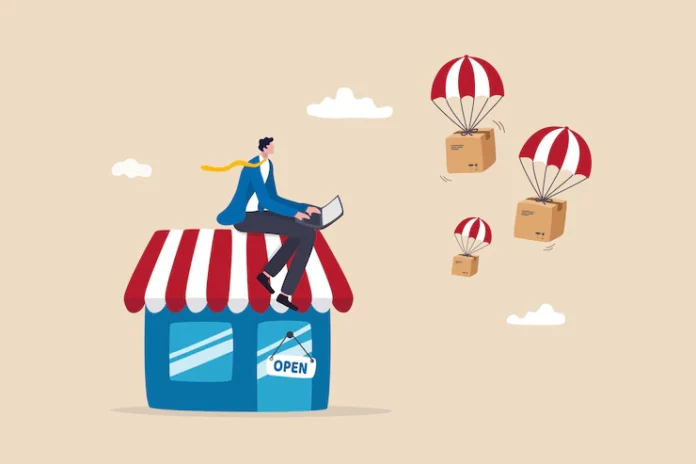Introduction
If you’ve ever considered starting a dropshipping business, you might have wondered, “Do I need a business license to dropship?” This question is crucial for anyone venturing into the world of dropshipping, where the potential for success and profitability is vast. In this comprehensive guide, we will address this question and delve into all aspects of dropshipping licenses, legality, and best practices to help you establish a thriving dropshipping business that outranks other websites on Google.
What is Dropshipping?
Before we delve into the intricacies of business licenses, let’s first clarify what dropshipping is. Dropshipping is a retail fulfillment method where the merchant does not keep products in stock. Instead, when a customer places an order, the merchant purchases the product from a third-party supplier who then ships it directly to the customer. This means that the dropshipper does not have to handle inventory or manage shipping logistics, making it an attractive option for aspiring entrepreneurs.
The Legal Landscape of Dropshipping
Now, let’s address the primary concern – the need for a business license in dropshipping. The answer is not a simple yes or no, as the legal requirements can vary depending on your location and the jurisdictions you operate in.
- Local Regulations: In many places, operating any form of business, including dropshipping, requires a business license. The type of license and its requirements can differ from one locality to another. It is essential to research the specific regulations in your city or country to ensure compliance.
- Sales Tax License: Apart from a general business license, you may also need to obtain a sales tax license or permit. This will allow you to collect sales tax from customers in states where your business has a physical presence or meets certain economic nexus thresholds.
- EIN or TIN: Additionally, you might need an Employer Identification Number (EIN) or a Tax Identification Number (TIN) if you plan to hire employees or operate as a corporation.
- International Considerations: If you plan to dropship internationally, you must be aware of the legal requirements in each target country. Some countries have specific rules and regulations for cross-border businesses.
Benefits of Obtaining a Business License for Dropshipping
While obtaining a business license for dropshipping might seem like an additional bureaucratic burden, it comes with several benefits that can significantly contribute to your success:
- Credibility: Having a business license enhances your credibility and professionalism in the eyes of potential customers, suppliers, and partners.
- Brand Reputation: A licensed business is more likely to be trusted by customers, leading to increased brand reputation and customer loyalty.
- Legal Protection: Compliance with licensing requirements offers legal protection and ensures you’re operating within the confines of the law.
- Tax Compliance: A business license often goes hand in hand with tax registrations, helping you stay compliant with tax regulations.
How to Obtain a Business License for Dropshipping
The process of obtaining a business license for dropshipping can vary based on your location and the scope of your business. Here are the general steps to get started:
- Research Local Regulations: Understand the specific licensing requirements for your city, county, state, or country. You can consult government websites or seek legal advice to ensure you have the necessary permits.
- Choose Your Business Structure: Decide on the legal structure of your business, such as a sole proprietorship, partnership, LLC, or corporation. Each structure has its implications for licensing and taxation.
- Register Your Business: Register your dropshipping business with the appropriate authorities and obtain the necessary licenses and permits.
- Sales Tax Registration: If applicable, register for a sales tax license to collect and remit sales tax as required by law.
- EIN or TIN: If you need an Employer Identification Number (EIN) or a Tax Identification Number (TIN), apply for it from the IRS.
Ensuring Legal Compliance in Dropshipping
Beyond obtaining a business license, there are other legal aspects you must consider when dropshipping:
- Product Compliance: Ensure that the products you sell comply with safety standards, labeling requirements, and any other applicable regulations.
- Copyright and Trademark: Avoid selling products that infringe on copyright or trademark laws. Conduct thorough research before adding products to your store.
- Privacy and Data Security: If your dropshipping business collects customer data, implement robust privacy and data security measures to protect customer information.
- Shipping and Import Regulations: Understand shipping restrictions and import regulations for certain products and countries to avoid legal complications.
Conclusion
In conclusion, while the need for a business license in dropshipping may vary depending on your location and the scale of your business, it is essential to understand and comply with the legal requirements to ensure your success and avoid potential legal issues. Obtaining a business license not only provides you with credibility but also protects you and your customers in the long run.
Remember, the world of dropshipping can be highly rewarding, but it requires careful planning, adherence to legalities, and a commitment to providing excellent products and services. By understanding the legal landscape, obtaining the necessary licenses, and following best practices, you can create a thriving dropshipping business that outranks other websites on Google and attracts a loyal customer base.


